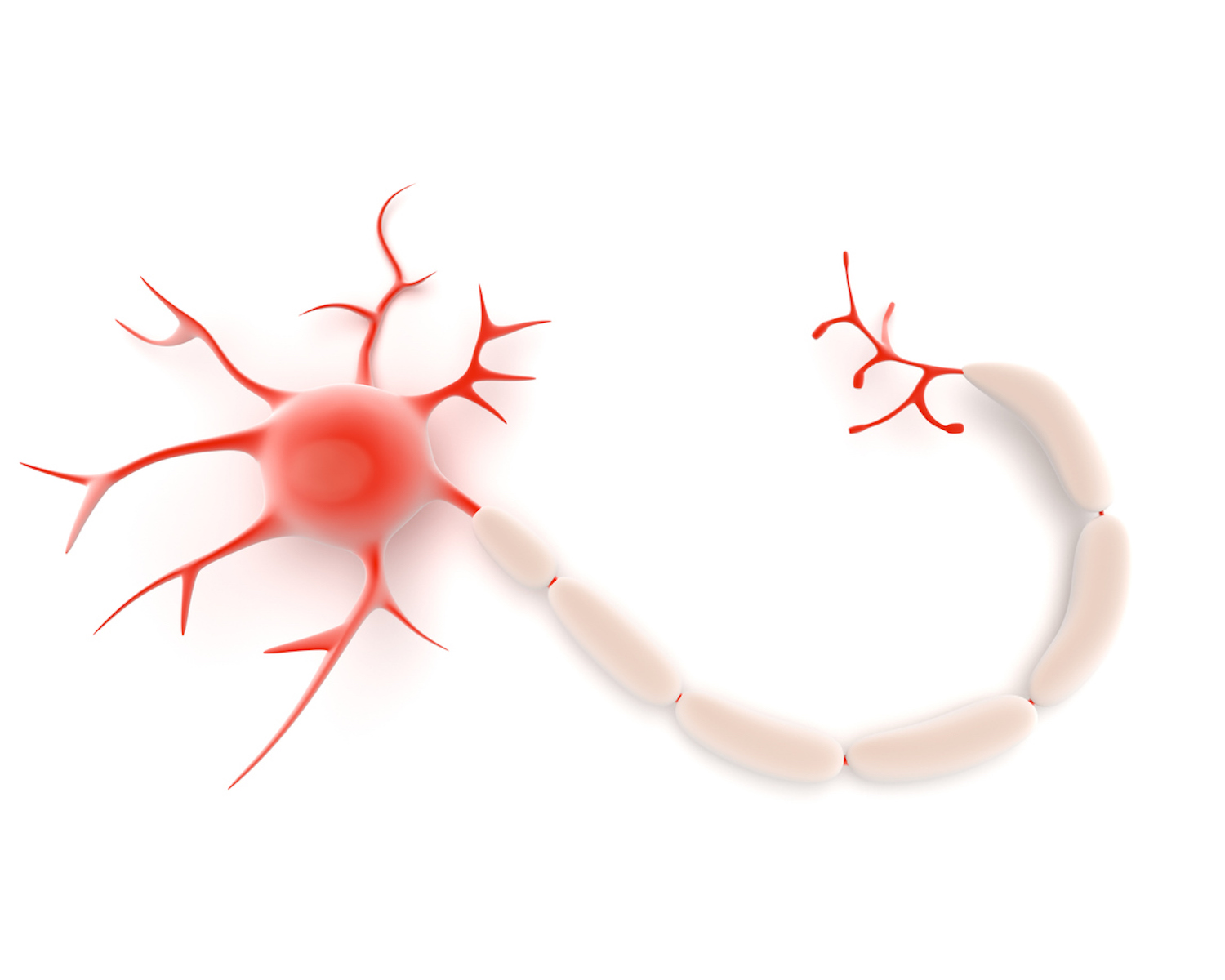
Your myelin, the insulation of your brain’s wiring, keeps your brain cells from grabbing other brain cells’ signals and getting confused. Good myelin helps you focus, serve a tennis ball, finish your expense reports, and so much more.
For a better brain, here’s a comprehensive guide to myelin and the top ways to feed and protect your brain.
What is myelin?
Myelin is a white-colored sheath made of mostly fat and cholesterol that wraps around a nerve cell. Myelin’s main function is to insulate the neuron, protect the axon, and direct the nerve’s impulse where it’s supposed to go.

Take this a step further. The circuitry of your brain is arranged more like a bundle of wires that all connect to different things.
The quality of the wires’ insulation – in brain speak, an axon’s myelin covering – is especially crucial when all of the wires are packed in close. Imagine you flip a switch to turn on a lamp and instead you fire up the hair dryer. Wiring like that leaves you with a lot to sort through.
When myelin wears down, the neuron’s signal hops onto an axon it wasn’t meant to activate. That opens you up to a whole host of potential problems with memory, movement, coordination and more.
Myelin decreases with age
Myelin decreases naturally with age,[ref url=”https://www.ncbi.nlm.nih.gov/pubmed/10918325 “][ref url=”https://link.springer.com/article/10.1023%2FA%3A1025731309829?LI=true “] partially because age limits the action of oligodendrocytes, the myelin-producing cells. Oligodendrocytes split into cells that produce myelin only until you’re in your late fifties.[ref url=”https://www.ncbi.nlm.nih.gov/pubmed/14675724”]
Even without the age factor, oligodendrocytes are the most vulnerable nervous system cells you have.[ref url=”https://www.ncbi.nlm.nih.gov/pmc/articles/PMC2799635/ “]
Some of the things that can mess with myelin production include:
- A high sugar diet
- Poor sleep quality
- Alcohol
- Nutrient deficiencies
- Hormonal imbalances
Giving myelin the right environment and nourishment helps you stay Head Strong throughout every stage of life.
What does myelin do?
The condition of your myelin impacts your:
- Motor control and coordination[ref url=”https://link.springer.com/article/10.1007/s00441-004-0956-9 “][ref url=”http://science.sciencemag.org/content/346/6207/318 “][ref url=”http://www.sciencedirect.com/science/article/pii/S0014488605001640”]
- Cognitive ability[ref url=”http://www.neurobiologyofaging.org/article/S0197-4580(05)00142-9/fulltext “][ref url=”https://www.ncbi.nlm.nih.gov/pmc/articles/PMC4771819/ “][ref url=” https://www.ncbi.nlm.nih.gov/pmc/articles/PMC1736409/”]
- Memory[ref url=”https://www.ncbi.nlm.nih.gov/pmc/articles/PMC1736409/”]
- Intelligence[ref url=”http://www.sciencedirect.com/science/article/pii/019188699490049″]
- Problem solving[ref url=”http://www.sciencedirect.com/science/article/pii/S0926641005002570?via%3Dihub”]
- IQ[ref url=”https://academic.oup.com/cercor/article-lookup/doi/10.1093/cercor/bhl125″]
- Reading ability[ref url=”https://www.ncbi.nlm.nih.gov/labs/articles/15850744/ “][ref url=”https://www.researchgate.net/publication/7866146_Children’s_Reading_Performance_is_Correlated_with_White_Matter_Structure_Measured_by_Diffusion_Tensor_Imaging”]
- Brain development[ref url=”http://www.sciencedirect.com/science/article/pii/S0083672905710049″]
- Reaction time[ref url=”http://www.pnas.org/content/102/34/12212.short”]
- Learning[ref url=”https://www.ncbi.nlm.nih.gov/pmc/articles/PMC2486416/ “][ref url=”http://science.sciencemag.org/content/346/6207/318”]
- Sensory perception[ref url=”http://www.nature.com/neuro/journal/v8/n9/full/nn1516.html “][ref url=”https://www.researchgate.net/publication/6855970_Morphometry_of_the_amusic_brain_A_two-site_study”]
- Attention[ref url=”http://onlinelibrary.wiley.com/doi/10.1002/hbm.20703/full”]
- Perception of reality[ref url=”http://www.pnas.org/content/98/8/4746.short “][ref url=”http://jamanetwork.com/journals/jamapsychiatry/article-abstract/207466”]
- Mood[ref url=”http://www.sciencedirect.com/science/article/pii/S0165178106004100″]
Myelin, oligodendrocytes and schwann cells
Before diving into ways to support your myelin, here’s a quick myelin what’s-what:
- Myelin is the fatty sheath itself
- Oligodendrocytes split off into myelin-producing cells in the central nervous system (brain and spinal cord)
- Schwann cells split into myelin-producing cells in the peripheral nervous system (everywhere else)
Now that you have those straight, you can get a better idea of what goes wrong and how to keep your myelin strong.
12 ways to improve your myelin
You don’t need major motor problems to start paying attention to your myelin. Simple forgetfulness and brain fog signal that your myelin is struggling.
Here’s what you can do for routine myelin maintenance.
1. Support your mitochondria
Frequent Bulletproof Radio guest Dr. Terry Wahls, MD reversed her MS by focusing on supporting her mitochondria. Mitochondrial abnormalities tank your metabolism, which steals yoru cells’ energy and causes a cascade that leads to lower myelin production and shoddy repair.[ref url=”http://journals.sagepub.com/doi/abs/10.1177/135245859700200602″]
Mitochondria get first dibs on brain energy. In fact, if energy drops low enough, the brain will break down myelin in order to liberate the energy potential in the fat-rich myelin sheath.[ref url=”http://www.sciencedirect.com/science/article/pii/S2352396415301924″]
If the right energy supply is available, your brain won’t attack itself to get what it needs to carry out processes. To keep the brain well-fed…
2. Eat the right fats
In another Bulletproof Radio episodes featuring Dr. Wahls, she explains that neural tissue is 70% saturated fat and cholesterol, so you need to be sure you give your brain the raw material it needs for myelin synthesis, repair and maintenance.
The highest cholesterol content in the brain is found in myelin, and cholesterol is essential to the myelin synthesis process Another vital fatty acid is DHA, the most abundant fatty acid in the brain. The availability of DHA.[ref url=”https://www.nature.com/neuro/journal/v8/n4/full/nn1426.html”] influences myelination[ref url=”https://www.ncbi.nlm.nih.gov/pmc/articles/PMC4772061/”]
3. Upgrade your sleep hygiene
Oligodendrocytes increase in number while you’re asleep.[ref url=”https://www.ncbi.nlm.nih.gov/pmc/articles/PMC3874087/ “] Sleep also turns on genes that repair and maintain myelin membranes.[ref url=”https://www.ncbi.nlm.nih.gov/pubmed/25821717″]
If you have a hard time falling asleep, a high-quality melatonin supplement will help you fall asleep with the added benefit of reducing inflammation in the brain.[ref url=”https://www.ncbi.nlm.nih.gov/pubmed/20856166.”] Inflammation wreaks havoc on your oligodendrocytes and myelin, so you need to keep brain inflammation at a minimum anyway.
4. Brain-derived neurotrophic factor (BDNF)
BDNF strengthens the brain cells you have and turns on genes to produce new neurons and pathways. Elevated BDNF levels increased the rate of myelination as well as the thickness of the sheath,[ref url=”https://www.ncbi.nlm.nih.gov/pubmed/15352212″] possibly by stimulating the production of myelin basic protein.[ref url=”http://onlinelibrary.wiley.com/doi/10.1111/j.1471-4159.2004.02911.x/full”]
BDNF shows promise for myelin repair, as a little extra BDNF stimulated remyelination in rats with nervous system injury.[ref url=”http://onlinelibrary.wiley.com/doi/10.1111/j.1460-9568.2000.01312.x/full”][ref url=”http://www.jneurosci.org/content/18/14/5354.short”]
5. Vitamin C and collagen
Vitamin C plays a crucial role in myelin formation. It turns on genes that stimulate the production of BDNF,[ref url=”https://www.ncbi.nlm.nih.gov/pmc/articles/PMC4179190/”] which helps brain cells survive and split into new neurons.[ref url=”https://en.wikipedia.org/wiki/Brain-derived_neurotrophic_factor”]
In addition to stimulating BDNF, vitamin C helps along collagen production in the brain, which is linked to the formation of the myelin sheath.[ref url=”http://www.ncbi.nlm.nih.gov/pmc/articles/PMC4179190/”] [ref url=”https://www.ncbi.nlm.nih.gov/pubmed/3624305/”] The ability of schwann cells to make collagen also indicate the quality of myelin that the schwann cells produce.[ref url=”https://www.ncbi.nlm.nih.gov/pmc/articles/PMC2649700/ “] Vitamin C is crucial to this process, because collagen synthesis doesn’t happen anywhere in the body without vitamin C.
6. Avoid alcohol
Chronic alcoholism speeds up normal age-related myelin deterioration in the brain.[ref url=”https://link.springer.com/article/10.1007%2FBF01001354?LI=true “] Even after alcoholics quit drinking, you’ll see damaged myelin, especially in the circuits that modulate impulsive behavior.[ref url=”https://www.ncbi.nlm.nih.gov/pmc/articles/PMC4293208/ “] That means it’s harder to resist the urge to drink after quitting.
7. Get enough iron
When your iron stores go low, your oligodendrocytes do not properly split into new cells and you won’t produce the myelin you would if you had enough iron.[ref url=”https://www.ncbi.nlm.nih.gov/pubmed/18837051 “] That said, too much iron can oxidize in the body, so don’t go overboard. Get your iron from grass-fed beef and lamb and green leafy vegetables instead of reaching for supplements.
8. Iodine to support thyroid health
Thyroid hormone impacts brain function starting with early brain development in utero.[ref url=”https://academic.oup.com/edrv/article-lookup/doi/10.1210/edrv.18.4.0309 “] Thyroid function directly affects myelin quality, and people with sluggish thyroids almost universally list brain fog at the top of the symptoms list.
The thyroid hormone T3 turns on myelin genes and signals the oligodendrocytes to differentiate into myelin-producing cells.[ref url=”https://www.ncbi.nlm.nih.gov/pubmed/1383426 “] Additionally, T3 reduces damage to neurons while promoting remyelination in damaged nerve cells.[ref url=”https://www.ncbi.nlm.nih.gov/pubmed/26725831″]
Thyroid hormone goes wonky for a number of reasons, the most common being iodine deficiency. Iodine deficiency measurably slows myelination.[ref url=”https://www.ncbi.nlm.nih.gov/pubmed/21802524”]
If you’re deficient, iodine supplementation is an easy fix. Iodine supplements are cheap, so it’s worth looking for a high-quality kelp iodine supplement that comes from waters with low levels of heavy metals. If you choose to supplement, talk to your doctor. You may also want a quality selenium supplement to go along with it.
9. Zinc and micronutrients
Micronutrient deficiencies impact brain function,[ref url=”https://www.ncbi.nlm.nih.gov/pubmed/22673824″] and animal studies indicate that the myelin-zinc connection may be involved in brain impairment from nutrient deficiencies.[ref url=”https://www.ncbi.nlm.nih.gov/pubmed/1382522″] Zinc ions strengthen the myelin sheath by preventing myelin basic protein from detaching from brain myelin membranes.[ref url=”http://onlinelibrary.wiley.com/doi/10.1111/j.1471-4159.1988.tb01803.x/full “] Lack of zinc could explain weaknesses and deterioration.
10. Feed your brain ketones
Ketones are brain energy. In the case of age-related mitochondrial dysfunction, the brain looks for ketones to meet energy demands. It craves ketones so badly that it will break down myelin in order to get to the fats it needs to generate ketones, and then it will use those ketones to make ATP for energy.[ref url=”http://www.sciencedirect.com/science/article/pii/S2352396415301924″]
Myelin benefits from the availability of ketones as well. High fat diets improve myelination[ref url=”http://onlinelibrary.wiley.com/doi/10.1111/epi.13193/full”] and when both ketones and glucose are available, the brain chooses ketones to synthesize myelin.[ref url=”http://www.sciencedirect.com/science/article/pii/0005276081903003″]
11. Exercise
Studies that assessed the effects of exercise on memory point to myelin as the reason for improvements. Exercise increased volume and thickness of myelin and at the same time reducing myelin loss,[ref url=”https://www.ncbi.nlm.nih.gov/pubmed/25817255″] which resulted in memory improvements.
Additionally, exercise improved memory by reducing myelin damage from lack of blood flow, which increased BDNF.[ref url=”https://www.ncbi.nlm.nih.gov/pubmed/27026692″]
12. Avoid EMFs
Living in a hyper-connected world, you are constantly exposed to EMFs unless you make a conscious effort to take a break from them. Electromagnetic field exposure contributes to myelin deterioration, especially in the elderly, in fetuses and in young people.[ref url=”https://www.ncbi.nlm.nih.gov/m/pubmed/25205214/ “] Researchers were able to induce demyelination and neurological problems in mice using long-term EMF exposure.[ref url=”https://www.ncbi.nlm.nih.gov/pmc/articles/PMC5247706/”]
Turning off your wi-fi and devices at night goes a long way.
What to do next
Do you need to start all of these supplements and practices at once? Probably not. Keeping tabs on on your attention, movement, ease of learning, and mood will clue you in on whether or not your myelin is in good shape. If you notice some slipping, incorporate one or two new things into your routine.
For maintenance, ease into the practices that benefit other areas of your biology. One example is consuming high-quality fats – you’ll see and feel the benefits head to toe. Another example is vitamin C, for immune system benefits and collagen synthesis. Do some self-experimentation to see which habits and supplements make an impact.
Thanks for reading, and stay Bulletproof!












